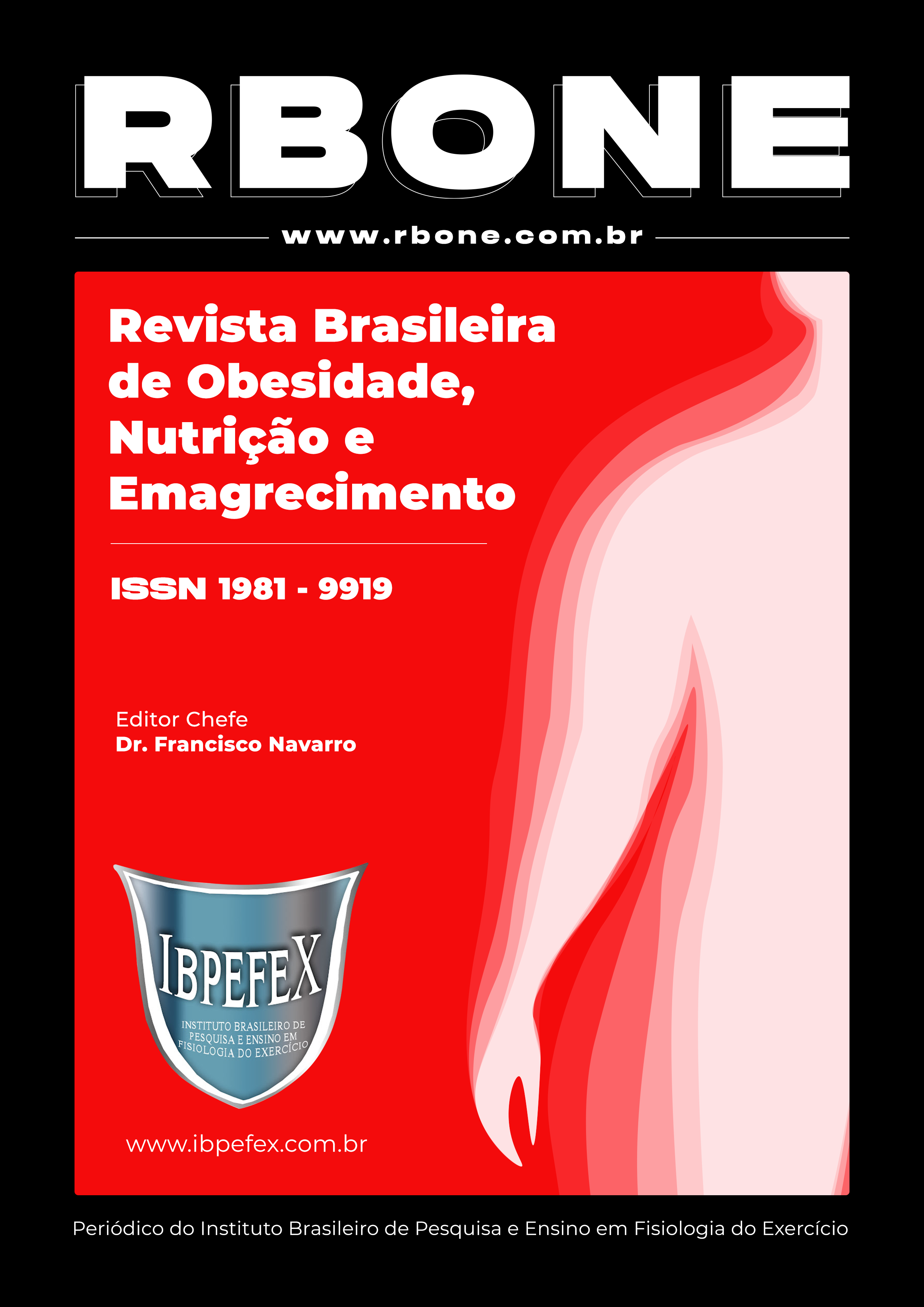Assessment of the risk of food disorders in individuals with obesity
Abstract
Introduction: The erroneous methods used to achieve the desired weight end up resulting in changes in eating behavior. In view of this, one can observe the increase in the prevalence of eating disorders in obese individuals, which cause several damages in physical and mental health. Objective: To evaluate the r isk of development for eating disorders in obese individuals treated at two clinics specialized in the treatment of obesity in Fortaleza-CE and through the Google Forms online platform. Materials and Methods: This is a cross-sectional study, of quantitative and descriptive character, in which 73 individuals participated, aged between 20 and 57 years old, 24 men and 49 women. Participants were assessed using a socioeconomic questionnaire and the Food Attitudes Test (EAT-26). Results: Of the total survey participants, 32.9% (n=24) were at risk for eating disorders. The significant variable for the presence of risk was in relation to BMI (p-value = 0.028). Female participants were at greater risk (75.0%), expressing extreme concern for their bodies and high calorie levels, which may associate their greater vulnerability to society and the established standards, also present in males, but less frequently. and susceptibility. Conclusion: In this way, it highlights the importance for the development of more studies focused on obesity and its eating behavior.
References
-Alvarenga, M.S.; Carvalho, P.H.B.; Philippi, S.T.; Scagliusi, F.B. Propriedades psicométricas da Escala de Atitudes Alimentares Transtornadas para adultos do sexo masculino. Jornal Brasileiro de Psiquiatra. Vol.62. Num.4. 2013. p.253-260.
-Alves, M.D.F.C.; Santos, C.W.G.; Castro, A.J.O.; Della Noce, R.R. Transtornos alimentares em obesos atendidos em um hospital universitário. Revista Brasileira de Obesidade, Nutrição e Emagrecimento. São Paulo. Vol.12. Num.70. 2018. p.182-189.
-Abeso. Associação Brasileira para o Estudo da Obesidade e da Sindrome Metabolica. Abeso: Mapa da Obesidade. São Paulo. 2018.
-Bohrer, B.K.; Forbush, K.T.; Hunt, T.K. Are common measures of dietary restraint and disinhibited eating reliable and valid in obese persons? Appetite. Vol.87. Num.1. 2015. p.344-351.
-Brasil. Ministério da Saúde. Conselho Nacional de Saúde. Resolução nº 466, de 12 de dezembro de 2012. Diário Oficial da República Federativa do Brasil. 12 de dezembro de 2012. Brasília-DF. 2012.
-Carvalho, P.H.B.; Freitas, L.G.; Ferreira, M.E.C. Comparação social, insatisfação corporal e comportamento alimentar em jovens adultos. Interação em Psicologia. Vol.20. Num.2. 2016.
-Cimadon, J.; Canci, B.T.; Riboldi, B.P.; Alves, M.K. Estado nutricional e fatores de risco para transtorno alimentares de bailarinos. Revista Brasileira de Nutrição Esportiva. São Paulo. Vol.11. Num.64. 2017. p.462-466.
-Costa, R.D.O.; Silva, J.P.; Lacerda, E.M.; Dias, R.; Pezolato, V.A.; Silva, C.A.D.; Cieslak, F. Overweight effect on spirometric parameters in adolescents undergoing exercise. Einstein. Vol.14. Num.2. 2016. p.190-19.
-Fortes, L.S.; Meireles, J.F.F.; Paes, S.T.; Dias, F.C.; Ciprian, F.M.; Ferreira, M.E.C. Associação da internalização dos padrões corporais, sintomas depressivos e comportamento alimentar restritivo em jovens do sexo masculino. Ciência & Saúde Coletiva. Vol.20. Num.11. 2015. p.3457-3465.
-Garner, D.M.; Olmsted, M.P.; Bohr, Y.; Garfinkel, P.E. The eating attitudes test: psychometric features and clinical correlates. Psychological medicine. Vol.12. Num.4. 1982. p.871-87.
-Kesser, A.L.; Poll, F.A. Relação entre imagem corporal, atitudes para transtornos alimentares e estado nutricional em universitárias da área da saúde. J Bras Psiquiatr. Vol.67. Num.2. 2018. p.118-25.
-Martins, I.P. Frequência de comportamentos de risco para transtornos alimentares entre universitários. TCC de Graduação em Nutrição. Universidade Federal de Mato Grosso. Faculdade de Nutrição. Cuiabá. 2018.
-Moreira, D.E.; Pinheiro, M.C.; Carreiro, D.L.; Coutinho, L.T.M.; Almeida, K.T.C.L.; Santos, C.A.; de Paula Ricardo, L.C. Transtornos alimentares, percepção da imagem corporal e estado nutricional: estudo comparativo entre estudantes de Nutrição e Administração. Revista da Associação Brasileira de Nutrição-RASBRAN. Vol.8. Num.1. 2017. p.18-25.
-Murakami, J.M.; Essayli, J.H.; Latner, J.D. The relative stigmatization of eating disorders and obesity in males and females. Appetite. Vol.102. Num.1. 2016. p.77-82.
-Nazar, B.P.; Pinna, C.M.S.; Suwwan, R.; Duchesne, M.; Freitas, S.R.; Sergeant, J.; Mattos, P. ADHD rate in obese women with binge eating and bulimic behaviors from a weight-loss clinic. Journal of Attention Disorders. Vol.20. Num.7. 2016. p.610- 616.
-Organização Mundial da Saúde. Obesity: preventing and managing the global epidemic. Report of a WHO consultation on obesity. Geneva, Switzerland: WHO 2000. (WHO Technical Report Series, n.894).
Copyright (c) 2022 Rafaella Maria Monteiro Sampaio, Francisca Maísa de Farias Barreto, Nathália Santana Martins Moreira

This work is licensed under a Creative Commons Attribution-NonCommercial 4.0 International License.
Authors who publish in this journal agree to the following terms:
- Authors retain the copyright and grant the journal the right of first publication, with work simultaneously licensed under the Creative Commons Attribution License BY-NC which allows the sharing of the work with acknowledgment of the authorship of the work and initial publication in this journal.
- Authors are authorized to enter into additional contracts separately for non-exclusive distribution of the version of the work published in this journal (eg, publishing in institutional repository or book chapter), with acknowledgment of authorship and initial publication in this journal.
- Authors are allowed and encouraged to post and distribute their work online (eg, in institutional repositories or on their personal page) at any point before or during the editorial process, as this can bring about productive change as well as increase impact and impact. citation of published work (See The Effect of Free Access).






